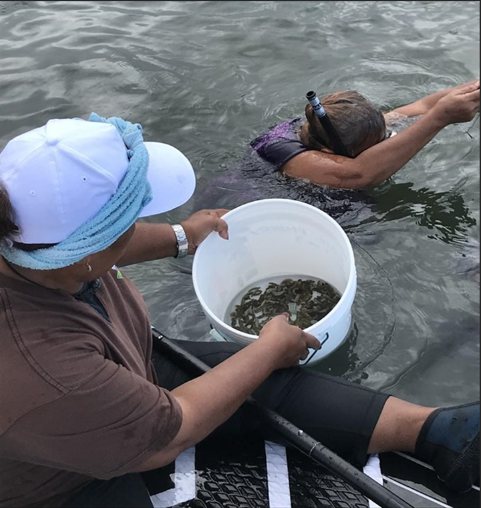Women fishers learn sustainable practices and give back to the ocean
Women fishers in Ngardmau, Palau are learning new ways to make a living while protecting the environment. With the help of Ebiil Society (Inc.) Kiwa Initiative project, they are now running four giant clam farms instead of traditional fishing.
The Ebiil Society provided each farm with 1,000 clam seeds totaling 4,000 for the entire project. Ngardmau's women fishers are clamming their way to a sustainable income and responsible fishing practices. The women in this project help each other out. They share best practices for maintaining their farms, which has resulted in impressive survival rates. Two farms have an incredible 98% survival rate, with the rest averaging a 79% rate.
The Ebiil Society Kiwa Initiative project has led to an unexpected development: women are now choosing to delay selling their clams in order to allow them to grow larger. This increases their potential profit as well as benefits the surrounding ecosystem. The women have noticed a rise in the number of baby clams near their farms, indicating natural reseeding. This has led to discussions about collaborating with the government to manage a portion of their adult clams specifically for this purpose.
Moreover, one of the most important activities the organisation has been doing, was to rear 8,000 sea cucumbers of sandfish and grayfish, which were then given to women in the fishing community for reseeding. A total of 49 participants cultured the sea cucumber seeds, including at least 22 women fishers from three different states. They also released 300 giant clams in the Ngarchelong-Bengall reef area, helping to bring back more life to the ocean.
As part of the project activities, the Ebiil Society Kiwa Initiative educated 231 students about seagrass ecology, habitat and biodiversity, endangered species, and women in fisheries through various educational programmes. They also monitored two sites and the Ngarchelong reef area and found a positive change in biomass, with over a 100% increase. In Toluk el Bad, the number of adult sandfish grew from five to 1800, covering an area of 18,000 square feet, while in Matul, the number increased from zero to 1500 in the same area. They have also started observing the spawning of brown-spotted sandfish and curry fish in the restored areas, conducting monitoring three days after the new moon and three days after the full moon.
The Ebiil Society project titled “Restoration of sea cucumbers wild stock / Women fisheries” is a local project under the Kiwa Initiative. The initiative is funded by the European Union (EU), Agence Française de Développement (AFD), Global Affairs Canada (GAC), Australian Government Department of Foreign Affairs and (DFAT) and New Zealand Ministry of Foreign Affairs and Trade (MFAT).
The Kiwa Initiative has established partnerships with the Pacific Community (SPC), the Secretariat of the Pacific Regional Environment Programme (SPREP) and the Oceania Regional Office of the International Union for Conservation of Nature (IUCN).



